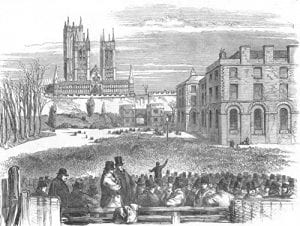Apologies that the C19 Research Group did not hold a session last Semester. Despite our name, this was not because we were busy researching a COVID-19 vaccine.
However, we do have two sessions lined up for Semester B, both of which will take place online for obvious reasons. The first will take place at 4.15pm (4.30pm start) on Tuesday 12th January 2021, when Matthew Bayly will talk to us on ‘Rabbits, Wheat and Laudanum: Agricultural and social change on the Lincoln Heath, c.1815-1850’. If you would like to attend, please email oclayton@lincoln.ac.uk and ask for the meeting link. All are welcome.
Please find an abstract and biography below. We hope to see lots of you there!
All best,
Owen, Alice, Pietro and Annise.
‘Rabbits, Wheat and Laudanum: Agricultural and social change on the Lincoln Heath, c.1815-1850’
A visitor to the Lincoln Heath in 1800 would have been presented with an agricultural landscape dominated by sheep and rabbit warrens; in contrast, by the mid-nineteenth century, the area typified Victorian ‘high farming’, characterised by mixed-agrarian wheat production. Such a change was at its most intense in the decades after 1815 and went far beyond agricultural practice, influencing such things as demography; the built environment; employment structures; social interactions; and the political-cultural landscape of the Lincoln Heath. Indeed, it can be argued that the period 1815 to 1850 was instrumental in defining the socio-economic expression of many areas of rural Lincolnshire until the mid-twentieth century. This paper will explore the development and impact of such changes within ten parishes in the Lincoln Heath, utilising three lenses to do so: rabbits, wheat and laudanum.
Biography
Matthew Bayly is a Senior English for Academic Purposes Tutor at the University of Lincoln and currently completing a PhD in History at Nottingham Trent University with a thesis titled ‘The Human Ecology of Need on the Lincoln Heath, c.1790-1850.’ His current research pivots around nineteenth century social history, with a specific interest in the English Poor Laws, the history of welfare and the politics of the parish.

Recent Comments